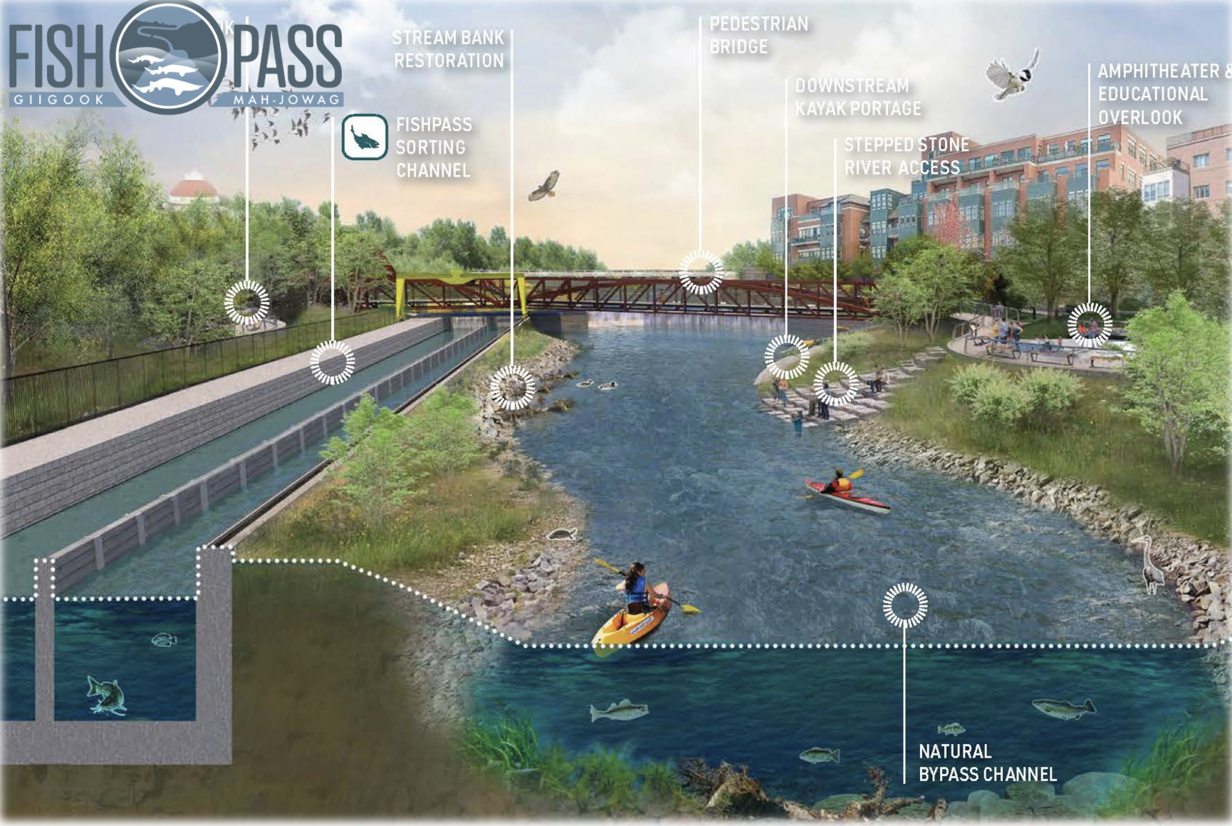
FishPass Agreement, New Staff Positions, Ethics Ballot Proposal on City Agenda
By Beth Milligan | June 16, 2025
Traverse City commissioners tonight (Monday) will consider approving an agreement outlining how FishPass will be operated and maintained by project partners once construction at the Union Street Dam site is completed – a target set for early 2027. Commissioners will also vote to formalize 13 new full-time staffing positions approved in the recent budget and to put a ballot proposal to voters in November that would allow an ethics ordinance to be added to the city charter.
FishPass Agreement
Commissioners tonight will vote to approve a memorandum of agreement (MOA) detailing how FishPass will operate for its first decade post-construction.
The first two phases of work – which will cover all in-stream components – on the roughly $30 million project at the Union Street Dam site are slated to be done by spring 2026. The final phase, covering all upland activities, is targeted to be finished by early 2027. Project partners on the experimental fish-passage system include the city, Grand Traverse Band of Ottawa and Chippewa Indians, Michigan Department of Natural Resources (DNR), and Great Lakes Fishery Commission (GLFC). Those partners signed a previous agreement in 2019 outlining roles and responsibilities in the project, such as GLFC obtaining funding, the city acquiring easements, and the DNR issuing scientific collection permits and blocking all fish passage up the Boardman/Ottaway until FishPass is complete.
The new MOA, which requires the approval of at least five commissioners, will run concurrently with the 2019 agreement to cover the first pivotal decade of research at FishPass. The MOA states that at least three staff members will be stationed at the FishPass research and education building (official name still to come) to “provide oversight of all FishPass research, outreach, communications activities, and day-to-day operation and maintenance of all research components.” Those will include a principal engineer/scientist, an assessment biologist, and a public affairs specialist – with other staff added as needed. Positions will all be staffed and funded by the GLFC.
The city isn’t required to allocate any funds under the MOA but will “allocate other resources,” according to City Manager Liz Vogel. The city will own the site and be responsible for operating the dam and non-research components, covering costs like utilities and janitorial services. That work is valued at a minimum in-kind contribution of $27,000 annually. GLFC is primarily responsible for FishPass research and operations, while the GT Band and DNR will both provide technical assistance and public education and outreach events. The GT Band will enforce tribal fishing regulations within the fish-sorting channel, labyrinth, and low-flow weirs, while the DNR will do the same for public fishing regulations. The DNR will also maintain operation of its weir facility under the MOA. All partners will have representation on a FishPass Advisory Board.
GLFC will commit to providing a minimum $600,000 annually to FishPass for staffing, research activities, and operations. Both the city and GT Band will transmit grant funding awarded to various FishPass projects to GLFC for implementation. The agreement outlines a dispute resolution process and allows the partners to terminate the MOA at any time by mutual agreement. However, assuming there are no conflicts and the partners desire to keep working together, the MOA is envisioned to be extended in the future.
“Upon the conclusion of research, it is implied that FishPass will have identified the optimal configuration of fish sorting technologies needed to achieve bi-directional selective fish passage between the Boardman/Ottaway River and Lake Michigan,” the proposal states. A new MOA in the future could address “if and what infrastructure changes may be needed to implement the permanent operational sequence for selective fish passage,” the language adds.
Also at tonight’s meeting...
> Commissioners will vote to formally create 13 new full-time city staff positions after recently approving their inclusion in the 2025-26 budget. Roughly half those positions – six – are new firefighters as part of the Traverse City Fire Department’s transition to becoming the city’s full-time ambulance provider. Staff said those hires, primarily funded through a voter-approved EMS millage, “represent the final staffing component” required for the transition. Other new positions include a detective sergeant, a stormwater equipment operator, a GIS/IT system administrator, a forestry/parks maintenance worker, and an engineering project coordinator. Two positions – a water treatment plant operator and marina dockmaster – are recommended to be increased from seasonal to full-time.
> Commissioners will consider putting a ballot proposal before voters in the November 4 election to amend the city charter to add an ethics ordinance. An ad hoc committee is currently working to draft that proposed ordinance, which would help guide behavior for city officials. The ballot language itself is straightforward, since it doesn’t cover the details of the ordinance – which are still to come and would need to be adopted by commissioners – but simply ensures the charter allows the new ordinance to be implemented. The proposed ballot language states: “Shall the Charter of the City of Traverse City be amended to require an ethics ordinance which shall apply to all elected and appointed officers, employees, and volunteers of the City of Traverse City?” Approving the ballot language now ensures there’s time for its required review by the governor and attorney general before the election filing deadline.
> Finally, commissioners tonight will consider committing up to $200,000 as a local match to apply for up to $1 million in federal Safe Streets and Roads for All grant funding; extending a contract agreement with Elmer’s Crane and Dozer to replace another 200 galvanized water service lines through fall 2026 using $2 million in state grant funding; and extending a lease agreement with the Grand Traverse Area Rock & Mineral Club to remain in the Carnegie Building through October 2026. Tonight’s commission meeting will also start with a presentation by the Human Rights Commission of the 2025 Sara Hardy Humanitarian Award – being bestowed posthumously to Holly T. Bird – and Humanitarian Business/Organization Award, being bestowed jointly to Michigan Indian Legal Services and the Grand Traverse Band of Ottawa and Chippewa Indians.
Comment






